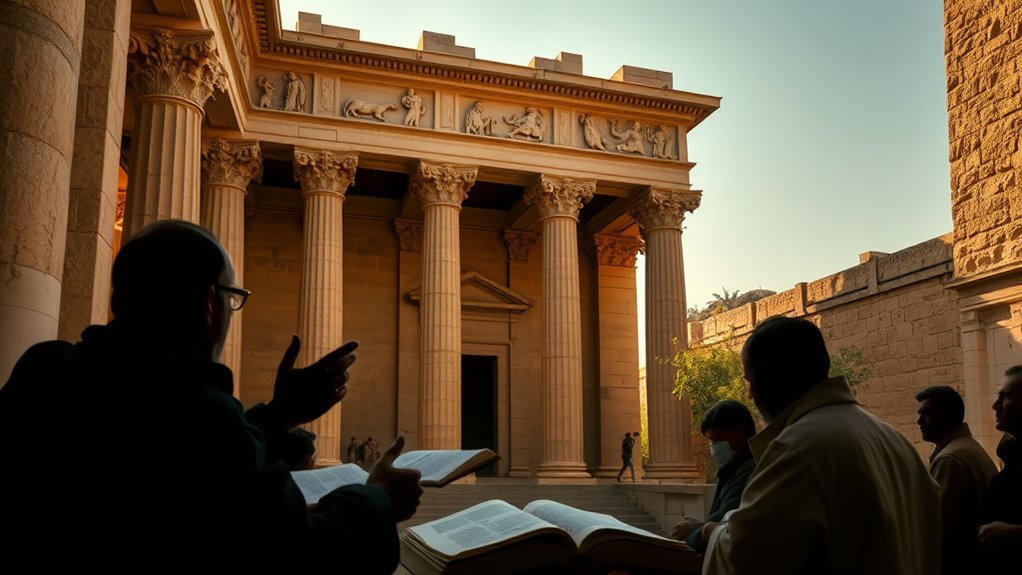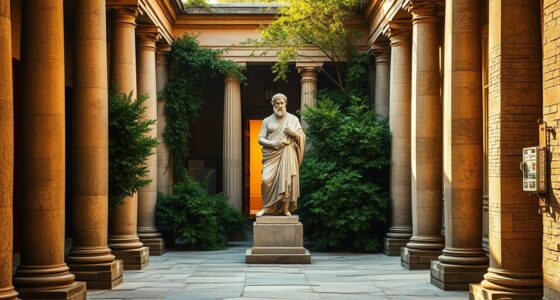At the Library of Alexandria, skeptics and dissenters were generally collected alongside other ideas, but the library’s attitude toward them was complex. While it aimed to gather all knowledge and encourage inquiry, political and cultural constraints often limited full acceptance of dissenting views. Skepticism was sometimes tolerated, but it could also be suppressed if it threatened societal norms or stability. To understand how these tensions played out, keep exploring the fascinating dynamics behind this legendary institution.
Key Takeaways
- The Library aimed to collect all knowledge, including skeptical and dissenting ideas, but faced censorship limitations.
- It likely housed contrasting viewpoints, fostering a space for questioning accepted beliefs within societal boundaries.
- Skeptics and dissenters were probably tolerated to some extent, but their ideas could be suppressed if seen as disruptive.
- The collection reflected an awareness of diverse perspectives, indicating a nuanced attitude toward skepticism.
- Overall, the Library balanced promoting inquiry with maintaining political and religious stability, shaping its stance toward skeptics.

Have you ever wondered whether the legendary Library of Alexandria truly held all the knowledge it’s famous for? It’s a question that sparks curiosity about what kind of ideas and voices the library might have embraced—or silenced. The library was more than a collection of scrolls; it was a symbol of ancient intellectual pursuits and the quest for understanding. Yet, beneath its reputation as a beacon of learning, there’s a complex history of ancient censorship that hints at how the library might have handled skeptics and dissent. While the library aimed to promote knowledge, it also operated within the boundaries of the political and cultural norms of its time, which sometimes meant restricting certain ideas.
Ancient censorship was a reality in many ancient institutions, and the Library of Alexandria was no exception. Scholars there sought to compile the most exhaustive collection of written works, but that didn’t mean every idea was freely welcomed. Some texts or ideas that challenged prevailing philosophies or political authority could have been suppressed or kept from circulation. This approach wasn’t unique to Alexandria; it reflected a broader tendency in the ancient world to control knowledge that might threaten established power or religious doctrines. In that sense, the library’s role in promoting intellectual freedom wasn’t absolute. It balanced the pursuit of knowledge with the risk of controversy, often leaning toward preserving stability over fostering open debate.
Ancient censorship shaped the Library of Alexandria’s pursuit of knowledge, balancing free inquiry with political and religious boundaries.
However, the library also symbolized a desire for intellectual freedom—an environment where curiosity and inquiry thrived. Many ancient scholars, like Euclid or Eratosthenes, pushed boundaries, questioning accepted ideas and seeking new truths. Their work suggests that, even within a context of censorship, there was space for skepticism and critical thinking. The library’s collection likely reflected a diversity of perspectives, including those that questioned traditional views. It’s tempting to think of the library as a sanctuary for skeptics, but history indicates that skepticism was often met with caution or suppression if it threatened societal or religious norms. Moreover, the presence of diverse perspectives in its collection demonstrates that the library was aware of the importance of diverse viewpoints for intellectual progress.
Ultimately, the Library of Alexandria’s attitude toward skeptics was probably nuanced. It was a place that aimed to gather all knowledge, yet it also operated within the constraints of its time, where ancient censorship shaped what could be openly discussed. While the library promoted the ideals of intellectual freedom, it did so in a context that sometimes limited dissent. Understanding this balance helps us appreciate the library’s legacy—not just as a monument to learning, but as an institution maneuvering through the complex realities of ancient censorship and the ongoing struggle for free thought.
Frequently Asked Questions
Did the Library of Alexandria Ever Record Debates on Skepticism?
You might wonder if the Library of Alexandria ever recorded debates on skepticism. While specific records are scarce, it’s likely that the ancient library hosted philosophical inquiry and discussions on skepticism, given its role as a hub for learning. The library probably preserved some ancient debate about questioning knowledge and beliefs, reflecting the broader intellectual culture of the time that embraced diverse perspectives in philosophical inquiry.
Were Skeptics Officially Tolerated or Persecuted at the Library?
Think of the Library of Alexandria as a grand stage for scholarly debates, where ideas clashed like swords. Skeptics were generally tolerated, but not always embraced, as the library aimed to preserve knowledge. Its censorship policies varied, sometimes restricting controversial views. While skeptics could participate in discussions, their ideas might face scrutiny or opposition. Overall, the library sought balance—encouraging inquiry while maintaining order amidst diverse perspectives.
Which Famous Skeptics or Doubters Are Associated With Alexandria?
You might find that ancient doubters like Democritus and Philo of Alexandria engaged in philosophical debates at the library. These figures questioned established ideas, fostering critical thinking. Their skepticism helped shape intellectual discourse in Alexandria, encouraging open inquiry. While not all skeptics faced persecution, their presence highlights that the library was a hub for diverse ideas, where questioning and doubt were part of the pursuit of knowledge and understanding.
How Did the Library Influence Early Skeptical Philosophy?
Imagine standing at the crossroads of knowledge, like the scholars in Alexandria. The library fueled philosophical inquiry and sparked epistemological debates, encouraging you to question certainty. It became a beacon for skeptics, inspiring doubt and critical thinking. Through its texts and ideas, you learn to challenge assumptions, shaping early skeptical philosophy. The library’s influence pushes you to seek evidence, fostering a tradition of inquiry that endures today.
Are There Surviving Texts From Skeptics in the Library’S Collection?
You wonder if ancient skepticism texts survive in the library manuscripts. Sadly, very few original works from skeptics like Pyrrho or Sextus Empiricus have been found among the library’s remnants. Most of what we are aware of comes from later sources. While the library aimed to preserve knowledge, the loss of many texts means only fragments of ancient skepticism remain today, leaving us to piece together their ideas from later copies and references.
Conclusion
So, now you see that the Library of Alexandria’s attitude toward skeptics was complex. They valued questioning and debate, understanding that doubt can lead to greater knowledge. They didn’t dismiss skeptics but welcomed their challenge to ideas. In the end, they knew that a closed mind is like a house with no windows—you miss out on the light of truth. Keep questioning, because that’s how true wisdom shines through.









